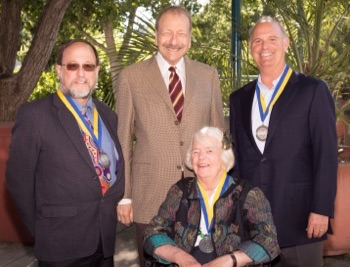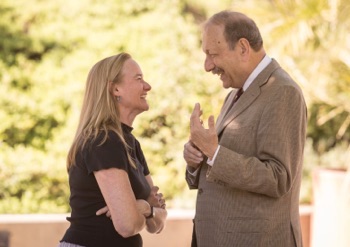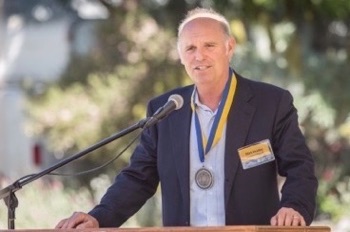Ronnie Lipschutz, professor of politics and provost of Rachel Carson College, was honored as the inaugural holder of the Robert Headley Presidential Chair for Integral Ecology and Environmental Justice at an investiture ceremony on Sunday, May 21, at Rachel Carson College.
The chair was established this year with gifts from the Helen and Will Webster Foundation and a matching contribution from the UC Office of the President, in partnership with Mark Headley (BA, politics and economics, Stevenson ’83) and his wife Christina Pehl.
The new endowed chair honors Mark Headley’s father, a longtime administrator at the UC Office of the President. Based at Rachel Carson College, the chair was established to support the work of a faculty member dedicated to educating students about the conceptual and applied aspects of environmental science and stewardship.
For the Headley family, the endowed chair is a tangible way to advance undergraduate education and support students who are taking on today's challenges of social responsibility and the environment.
"Our family is tremendously pleased and honored to join with the Webster Foundation to support the vital work of Rachel Carson College and UC Santa Cruz," said Headley. "This chair is a perfect legacy for my father, who not only spent his life working in the UC system but was lifted up from poverty by it."
Headley was joined in attendance at the investiture by his mother, Jane; his wife, Christina; his brothers Dean and David; his children Nora and Dean; and his nephews Ryan and Eliot—an environmental studies student who just transferred to UC Santa Cruz from Cabrillo College.
Lipschutz, who joined the faculty in 1990, is in his fifth year as provost of Rachel Carson College. His scholarly interests encompass global political economy with an emphasis on U.S. economic and military policy, changing forms of war, global governance, environmental politics, and sustainability.
"I cannot begin to tell you what an honor and thrill it is to be chosen as the inaugural holder of the Robert R. Headley Chair of Integral Ecology and Environmental Justice at Rachel Carson College," Lipschutz said during the ceremony, which took place in the courtyard of Rachel Carson College.
As the chair holder, Lipschutz looks forward to advancing the college's theme of "environment and society" by giving undergraduates rich learning and research opportunities. Lipschutz's own work acknowledges the links between environmental protection and restoration, poverty, social justice, the rights of the disenfranchised, and the role of engaged, activist citizens.
Lipschutz was instrumental in the renaming last year of Rachel Carson College, formerly College Eight, which was made possible by a gift from the Helen and Will Webster Foundation. As provost, he approached Alec and Claudia Webster about naming the college after the crusading writer whose book Silent Spring documented the devastating environmental impacts of the widespread use of pesticides, including DDT. Lipschutz was also instrumental in establishing the campus's new minor in sustainability studies, as well as a new two-unit class called "STEM Success" designed to help students who want to major in STEM fields—science, technology, engineering, and mathematics—succeed in the prerequisites necessary to qualify for those majors; it is offered jointly to students at Rachel Carson College and Oakes College.
Given his familiarity with the college and its needs, Lipschutz is uniquely suited to hold the chair, said Chancellor George Blumenthal, who noted that it is the first chair to be affiliated with one of the campus's residential colleges—and appears to be the first in the UC system named for a UC staff member.
"Robert Headley devoted his professional life to the University of California," said Blumenthal. "Nearly all of his 40 years of service were in the Office of the President's systemwide personnel administration."
Robert Headley, who died in 2001, developed salary structures, retirement policies, and affirmative action guidelines for staff. "The Robert Headley Presidential Chair recognizes and celebrates Bob's many decades of service to the UC system," said Blumenthal, who presented medals to Mark Headley and his mother Jane.
Blumenthal has made fundraising for faculty chairs a priority of the Campaign for UC Santa Cruz, which has raised more than $316 million for the campus.
Headley and Pehl are generous, longtime supporters of the campus whose gifts support student opportunity, social justice, and the environment. In 2014, they established the Dorothy Everett Chair to honor a woman who provided high-level support to four UC presidents and was a close colleague of Robert Headley's.
The Dorothy Everett Chair supports a program that combines practical training in information technology with student-driven social justice ventures. Student interns take workshops to build their technological expertise, which they then share with nonprofit organizations and other entities that lack computing infrastructure. This popular, grassroots program helps bridge the digital divide while empowering students as agents of social change. A subsequent gift from Headley and Pehl changed the name of the Global Information Internship Program (GIIP) to the Dorothy Everett Program for Global Information and Social Entrepreneurship.
----
The Campaign for UC Santa Cruz supports excellence across the university through increased private investment in the people and ideas shaping the future. It is bringing critical new resources to the student experience, excellence in research, and the campus commitment to environmental and social justice.
Ronnie Lipschutz appointed to chair in integral ecology and environmental justice





